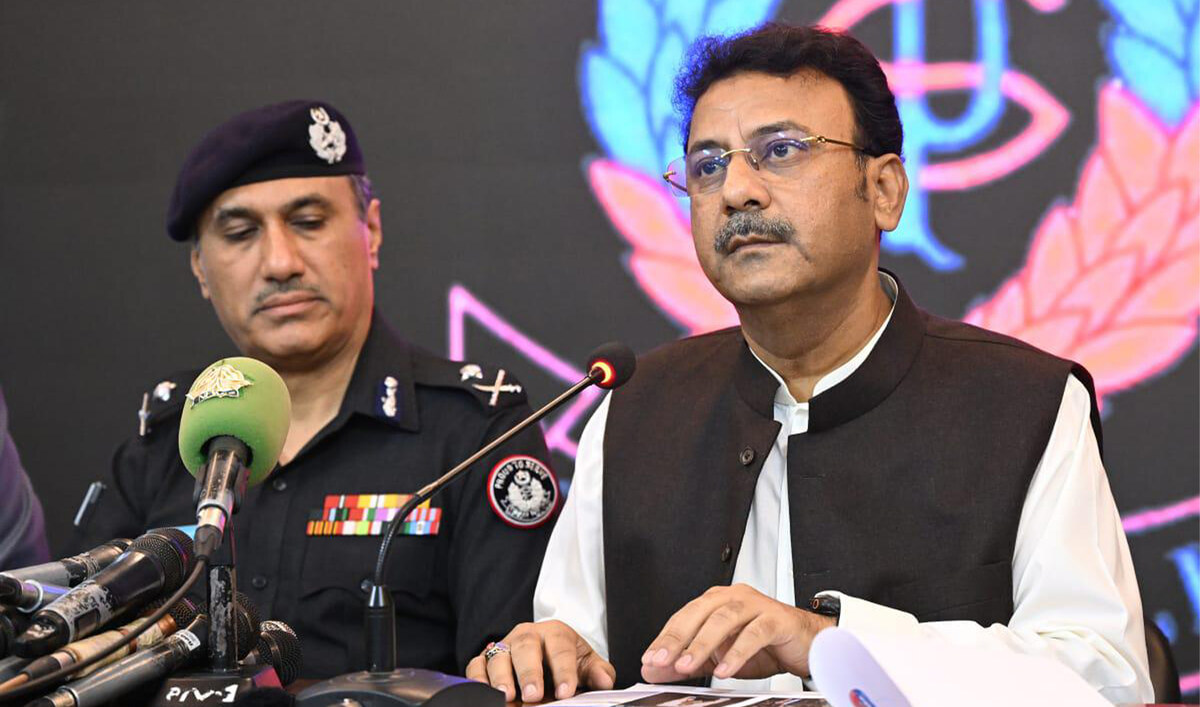ISLAMABAD: The situation became tense in and around Rawalpindi today, Saturday, as police fired tear gas shells to disperse hundreds of supporters of former prime minister Imran Khan’s Pakistan Tehreek-e-Insaf (PTI) party ahead of its planned protest in the city.
Security had been beefed up with containers placed at the entry and exit points of the garrison city of Rawalpindi to deter Khan supporters from entering. The PTI aims to build public pressure on the government for Khan’s release, who has been in jail after a string of convictions in several cases ranging from treason to corruption.
Khan’s party is also protesting against the government’s proposed constitutional amendments that it alleges are being used to suppress the freedom of the judiciary, an allegation the government denies.
A day earlier, the Punjab Home Department issued a notification announcing the imposition of Section 144, a legal provision that allows for a ban on an assembly of four or more people. The ban was imposed in Rawalpindi, Jhelum, Chakwal and Attock cities of Punjab ahead of the PTI’s protest.
“God willing, you will see what will happen today,” Khyber Pakhtunkhwa Chief Minister Ali Amin Gandapur told reporters from inside his car, leading a convoy of hundreds of charged up supporters toward Rawalpindi.
“Section 804 has been imposed across Pakistan,” he shouted, referring to the prisoner identification number assigned to Khan when he was first arrested in August last year.
Video clips on social media showed police officers firing tear gas shells toward PTI supporters in a bid to disperse them before reaching Rawalpindi.
PTI leader Shaukat Yousafzai uploaded a video on social media in which a thick cloud of smoke can be seen in the background.
“You can see that they have started shelling at Attock,” Yousafzai said. “They are shelling unarmed citizens. But God willing, they will not be able to stop us.”
Discussing the situation in a media talk, Senator Talal Chaudhry of the ruling Pakistan Muslim League-Nawaz party said protest was everyone’s right, but “we will not allow violence and disruption in the name of protest.”
He also questioned the rationale behind the protest at a time when the country’s economy was improving.
“Is this protest taking place because inflation has come down in Pakistan from 37 percent to 9 percent,” he asked. “Is this protest taking place because Pakistan’s stock exchange has reached from 40,000 to 80,000 points?”
He wondered why did “armed people from other provinces” come to Punjab to protest.
“This is not a protest but an attempt to generate violence,” he added. “They want to create such circumstances where people once again talk about default in Pakistan. Once again, the poor have nothing to eat [and] Pakistan moves toward chaos again. We won’t let such attempts by these people succeed.”
Earlier, while speaking to reporters at a news conference in Lahore, Punjab Information Minister Azma Bokhari warned protesters of stern action if they take the law into their own hands.
“Section 144 has been imposed in Rawalpindi and Rangers have been deployed also,” Bokhari warned. “And today if anyone tries to interfere in peace and security, if anyone tries to take the law into their hands, tries to block streets or public squares, then the law will deal with them with an iron fist.”
PTI RALLIES THIS MONTH
Following rallies this month in Islamabad and Lahore, the PTI announced this week it would hold public gatherings in Rawalpindi and Lahore on Sept. 28 and Oct. 5, respectively, to build pressure for Khan’s release.
The ex-PM has been in jail since August last year on multiple charges including corruption, sedition and terrorism. Khan says the cases against him are politically motivated to keep him and his party away from politics.
The PTI’s last two rallies were not without complications. The Sept. 8 rally in Islamabad was first planned for July and then August but was postponed both times as the party was denied permission to hold it by the district administration which cited security threats and a lack of resources to manage large gatherings.
After the Islamabad rally, a number of PTI legislators were arrested on charges of violating an agreement on the basis of which permission for the rally was given, including abiding by a time limit and supporters sticking to certain routes to reach the designated venue for the rally on Islamabad’s outskirts.
Last Saturday’s gathering in Lahore also came to an abrupt end after authorities cut off electricity supply to the venue after the 3-6pm deadline expired.
Khan’s party says the challenges in holding rallies are part of an over year-long crackdown it has faced since protesters allegedly linked to the party attacked and damaged government and military installations on May 9, 2023, after the former premier’s brief arrest the same day in a land graft case.
Hundreds of PTI followers and leaders were arrested following the riots and many remain behind bars as they await trial. The military, which says Khan and his party were behind the attacks, has also initiated army court trials of at least 103 people accused of involvement in the violence.
Khan, who has been in jail since last August, was ousted from the PM’s office in 2022 in a parliamentary vote of no confidence after what is widely believed to be a falling out with Pakistan’s powerful military, which denies being involved in politics.


















